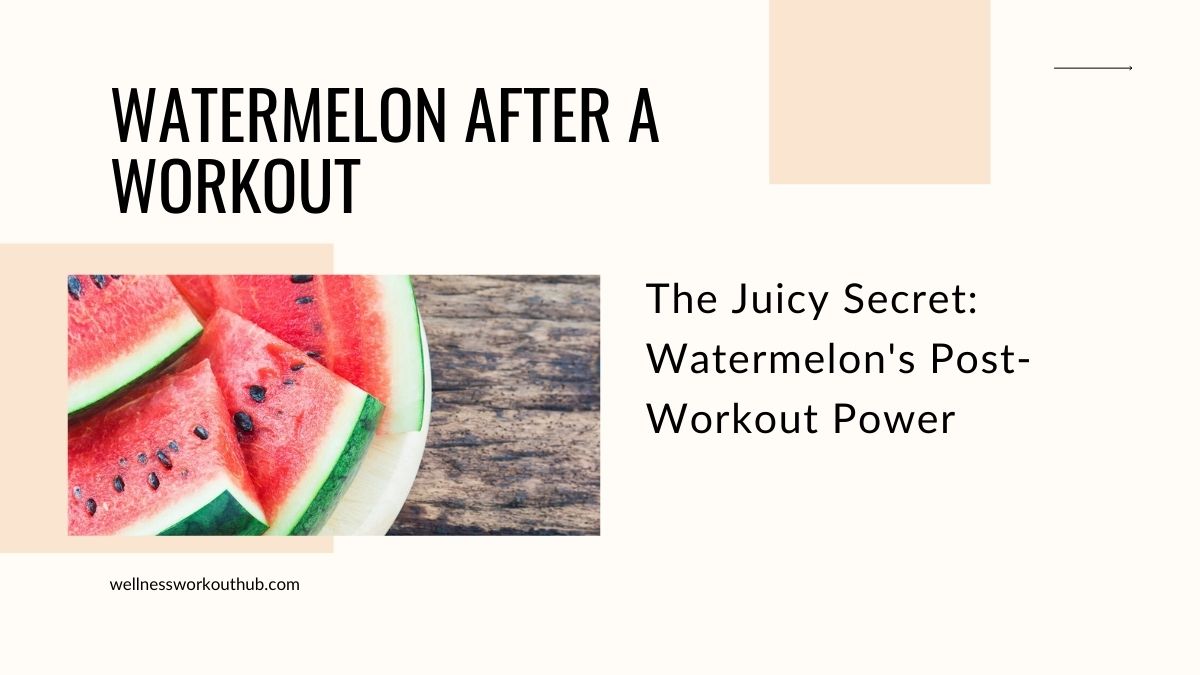Welcome to the world of fitness where every workout session counts towards achieving your goals. But what if I told you there’s a delicious and refreshing way to boost your recovery and replenish your energy levels post-workout? Yes, you guessed it right – watermelon! This juicy fruit isn’t just a summer favorite; it’s a powerhouse of nutrients that can aid in your fitness journey. In this comprehensive guide, we’ll dive deep into why watermelon makes for the perfect post-workout snack, backed by science and expert opinions.
The Science Behind Watermelon’s Benefits
Understanding Hydration and Electrolyte Balance
Hydration is key to optimal performance during workouts, and watermelon can play a crucial role in replenishing lost fluids. With its high water content (over 90%), indulging in this juicy fruit post-workout helps in rehydrating your body effectively. Moreover, watermelon contains essential electrolytes like potassium and magnesium, which are vital for maintaining fluid balance and preventing muscle cramps.
Antioxidant-Rich Properties
Watermelon isn’t just water; it’s packed with antioxidants like lycopene, vitamin C, and beta-carotene. These antioxidants help combat oxidative stress induced by intense workouts, reducing inflammation and aiding in muscle recovery. Studies have shown that lycopene, specifically abundant in watermelon, possesses anti-inflammatory properties, making it a valuable addition to your post-workout routine.
Muscle Recovery and Protein Synthesis
After a strenuous workout, your muscles undergo microscopic damage, which is a natural part of the muscle-building process. Consuming watermelon post-workout can expedite muscle recovery due to its amino acid content, particularly citrulline. Citrulline is converted into arginine in the body, promoting blood flow and enhancing nutrient delivery to muscles, thereby facilitating protein synthesis and repair.
Watermelon: Nature’s Nutrient Powerhouse
Vitamin and Mineral Profile
Beyond its hydration benefits, watermelon boasts an impressive nutrient profile. It’s rich in vitamins A, B6, and C, as well as minerals like potassium and magnesium. These nutrients are vital for various bodily functions, including immune function, nerve signaling, and energy metabolism. Incorporating watermelon into your post-workout regimen ensures you’re replenishing these essential nutrients lost during exercise.

Low-calorie, High-Volume Snack
For fitness enthusiasts watching their calorie intake, watermelon emerges as a winning choice. Despite its sweet taste, watermelon is relatively low in calories and fat, making it a guilt-free indulgence post-workout. Its high water and fiber content contribute to a feeling of fullness, preventing overeating and supporting weight management goals.
Digestive Health Benefits
The fiber content in watermelon aids digestion and promotes gut health, which is often overlooked but crucial for overall well-being. After an intense workout, your digestive system may need a little TLC, and watermelon steps in perfectly to provide the necessary fiber to keep things moving smoothly.
Creative Ways to Enjoy Watermelon Post-Workout
Watermelon Smoothie Delight
Blend chunks of watermelon with Greek yogurt, a handful of spinach, and a splash of coconut water for a refreshing and protein-packed post-workout smoothie. Customize with your favorite protein powder or add a dash of lime for extra zing.
Watermelon and Feta Salad
Combine diced watermelon with fresh mint leaves, crumbled feta cheese, and a drizzle of balsamic glaze for a savory-sweet salad that’s both satisfying and nutritious. This combination provides a balance of flavors and nutrients, perfect for replenishing after a workout.
Frozen Watermelon Pops
For a fun and cooling treat, insert popsicle sticks into watermelon wedges and freeze them for a few hours. These frozen watermelon pops make for a delightful post-workout snack, especially on hot summer days.
Timing Your Watermelon Intake
Post-Workout Window
Timing is crucial when it comes to maximizing the benefits of your post-workout nutrition, and the same applies to consuming watermelon. Aim to enjoy this juicy fruit within the first 30 minutes to an hour after completing your workout. During this window, your body’s nutrient uptake is heightened, allowing for faster absorption of the essential vitamins, minerals, and amino acids present in watermelon.

Pre-Workout Considerations
While watermelon shines as a post-workout snack, its hydrating properties make it a suitable option for pre-workout as well. Consuming watermelon before hitting the gym can help ensure adequate hydration levels, enhancing your performance and endurance during exercise. However, be mindful of portion sizes to prevent discomfort during your workout.
Incorporating Watermelon into Your Meal Plan
Beyond post-workout consumption, consider incorporating watermelon into your daily meal plan for sustained hydration and nutrient support. Whether enjoyed as a standalone snack, added to salads, or blended into smoothies, there are endless possibilities for integrating this versatile fruit into your diet.
Debunking Common Myths About Watermelon
Myth: Watermelon is Just Water and Sugar
While it’s true that watermelon has a high water content and contains natural sugars, it also provides an array of vitamins, minerals, and antioxidants essential for overall health and well-being. Don’t underestimate the nutritional value of this hydrating fruit.
Myth: Watermelon Causes Weight Gain
Contrary to popular belief, watermelon can actually support weight management goals when consumed as part of a balanced diet. Its low calorie and high water content make it a filling snack that satisfies cravings without adding excess calories.
Myth: Watermelon Should Be Avoided by Diabetics
While watermelon does contain natural sugars, its glycemic index is relatively low, making it a suitable option for individuals with diabetes when consumed in moderation. As always, it’s essential to monitor portion sizes and account for carbohydrate intake within your overall meal plan.
Final Thoughts: Embracing Watermelon in Your Fitness Journey
In conclusion, watermelon emerges as a delicious and nutritious ally in your fitness journey, offering hydration, muscle recovery support, and a host of essential nutrients. By incorporating this juicy fruit into your post-workout routine and beyond, you can elevate your performance, enhance recovery, and enjoy the refreshing taste of summer year-round. So, the next time you’re craving a post-workout snack, reach for nature’s perfect remedy – a juicy slice of watermelon!
Conclusion
Incorporating watermelon into your post-workout routine can elevate your recovery game to new heights. From its hydrating properties to its muscle-repairing abilities, this juicy fruit offers a multitude of benefits backed by science. So, the next time you hit the gym or break a sweat, remember to reach for nature’s perfect post-workout snack – watermelon!
With its high water content, electrolyte balance, and antioxidant-rich composition, watermelon stands out as an optimal choice for replenishing fluids, reducing inflammation, and supporting muscle recovery after a workout. Additionally, its low-calorie nature and digestive health benefits make it a versatile and guilt-free option for fitness enthusiasts of all levels.
Top Frequently Asked Questions
While watermelon can be enjoyed before a workout for its hydration benefits, it’s recommended to consume it post-workout to aid in muscle recovery and replenish lost nutrients.
There’s no one-size-fits-all answer, but a serving of 1-2 cups of watermelon chunks post-workout is a good starting point. Adjust according to your individual calorie and nutrient needs.
While watermelon is generally safe for consumption, overindulging may lead to gastrointestinal discomfort due to its high water and fiber content. Moderation is key to enjoying its benefits without any adverse effects.

